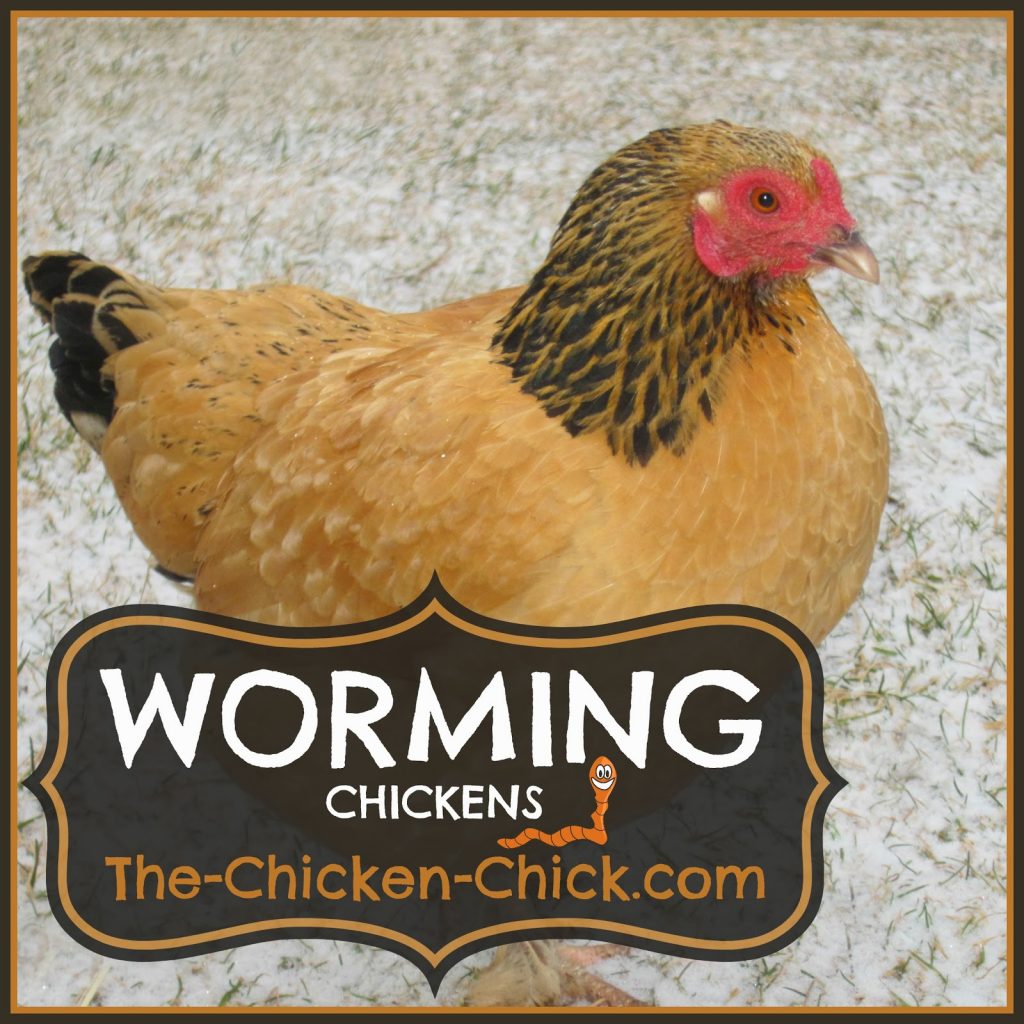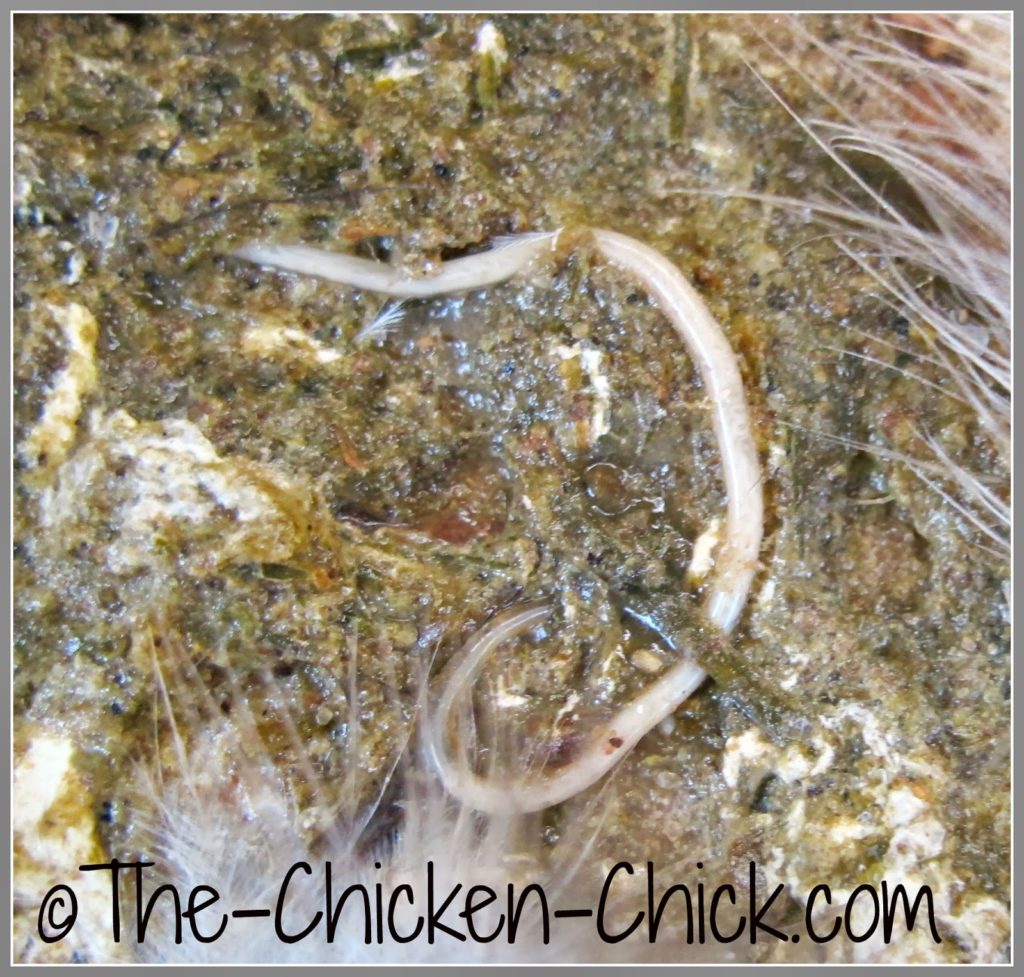Today’s question in my series “Answers from The Chicken Vet” comes from Linda M.:
Q: Do you need to worm preventative or only with symptoms?
A: Great question Linda! It’s a little more complicated than it appears at first blush, however. The obvious follow-up would be “what preventative drugs would you use?” This is even more complicated.
There are several types of worms that cause infections (helminthiases in vet-speak). There are tape-worms, roundworms, threadworms and flatworms. If you are interested in weird life-cycles, they are a LOT of fun. For example, the tapeworm Prosthogonimus macrorchis has to have its egg eaten by a water snail, where they reproduce asexually creating “cercariae”. The cercariae then infect immature dragonflys. The dragonflys metamorphose into adults, which makes the cercariae capable of infecting hens. A chicken then eats the adult dragonfly, completing the cycle. This little story should tell you 2 things….1 – be amazed how nature makes things work, and 2 – thank your lucky stars you did not have to sit through this stuff in vet school!
Now, the practical aspects of worms and chickens. There are actually few worms that cause true disease in hens. There is gapeworm, which can cause respiratory distress, and some intestinal nematodes can cause some slowed growth, and threadworms can cause some production drops in commercial birds. All these infections assumedly cause some discomfort while the immature worms migrate through the body. But, there is not that much pathology that results from worm infections. There is an “ick” factor though. Many people don’t like the idea of creepy-crawlies inside their birds. Plus, it is uncommon, but occasionally, birds that have a worm infection can produce an egg with a roundworm in it. Some people find this off putting. The other thing is that the hens will often carry quite a load of worms before showing any signs. This bothers some owners as well.
To control worms, the best strategy is to control the worms twice per year. Once when you bring the hens off range in the fall, and once when you go to put the hens back on range in the spring. The idea is that there will be an increase in worm load in the tighter quarters of the coop over winter. If you decrease the parasite load before you bring the birds in, the amount of worm eggs in the coop will grow slowly. Then when you move them back out on range, where the worms can continue with their life cycle, knock them back again, to slow the increase in numbers.
What product should you use to control worms? Here is an issue that gets some people’s dander up. Most worm medications have no claim for laying hens. As such, they won’t tell you how long not to eat the eggs after treatment, like many antibiotics do. The reason is simple….the research has not been done. It literally costs millions of dollars to get label claims on medications verified to the satisfaction of licensing bodies. Because modern egg farms have essentially no worm infections, it is not cost effective to get the claim on the drug in question. Poultry medication is a victim of its own success. The reality is that most of the products are safe, and most don’t even get into the egg….they are medications that affect the gut, and seldom are absorbed into the bloodstream. The problem is that there is no proof of their safety. Piperazine, (Wazine) levamisole, fenbendazole (Safe-guard) and hygromycin are all effective anthelminthics (anti-worm drugs….NEVER play scrabble against a vet!), and to keep resistance from developing in the worms in your chickens, you should rotate 2 or 3 of them in a program. Use product A in the fall, Product B in the spring, Product C in the following spring….etc.
I hope this answers your questions,
Dr. Mike Petrik, DVM, MSc
The Chicken Vet
Kathy Shea Mormino
Affectionately known internationally as The Chicken Chick®, Kathy Shea Mormino shares a fun-loving, informative style to raising backyard chickens. …Read on


shop my SPONSORS
Today’s question in my series “Answers from The Chicken Vet” comes from Linda M.:
Q: Do you need to worm preventative or only with symptoms?
A: Great question Linda! It’s a little more complicated than it appears at first blush, however. The obvious follow-up would be “what preventative drugs would you use?” This is even more complicated.
There are several types of worms that cause infections (helminthiases in vet-speak). There are tape-worms, roundworms, threadworms and flatworms. If you are interested in weird life-cycles, they are a LOT of fun. For example, the tapeworm Prosthogonimus macrorchis has to have its egg eaten by a water snail, where they reproduce asexually creating “cercariae”. The cercariae then infect immature dragonflys. The dragonflys metamorphose into adults, which makes the cercariae capable of infecting hens. A chicken then eats the adult dragonfly, completing the cycle. This little story should tell you 2 things….1 – be amazed how nature makes things work, and 2 – thank your lucky stars you did not have to sit through this stuff in vet school!
Now, the practical aspects of worms and chickens. There are actually few worms that cause true disease in hens. There is gapeworm, which can cause respiratory distress, and some intestinal nematodes can cause some slowed growth, and threadworms can cause some production drops in commercial birds. All these infections assumedly cause some discomfort while the immature worms migrate through the body. But, there is not that much pathology that results from worm infections. There is an “ick” factor though. Many people don’t like the idea of creepy-crawlies inside their birds. Plus, it is uncommon, but occasionally, birds that have a worm infection can produce an egg with a roundworm in it. Some people find this off putting. The other thing is that the hens will often carry quite a load of worms before showing any signs. This bothers some owners as well.
To control worms, the best strategy is to control the worms twice per year. Once when you bring the hens off range in the fall, and once when you go to put the hens back on range in the spring. The idea is that there will be an increase in worm load in the tighter quarters of the coop over winter. If you decrease the parasite load before you bring the birds in, the amount of worm eggs in the coop will grow slowly. Then when you move them back out on range, where the worms can continue with their life cycle, knock them back again, to slow the increase in numbers.
What product should you use to control worms? Here is an issue that gets some people’s dander up. Most worm medications have no claim for laying hens. As such, they won’t tell you how long not to eat the eggs after treatment, like many antibiotics do. The reason is simple….the research has not been done. It literally costs millions of dollars to get label claims on medications verified to the satisfaction of licensing bodies. Because modern egg farms have essentially no worm infections, it is not cost effective to get the claim on the drug in question. Poultry medication is a victim of its own success. The reality is that most of the products are safe, and most don’t even get into the egg….they are medications that affect the gut, and seldom are absorbed into the bloodstream. The problem is that there is no proof of their safety. Piperazine, (Wazine) levamisole, fenbendazole (Safe-guard) and hygromycin are all effective anthelminthics (anti-worm drugs….NEVER play scrabble against a vet!), and to keep resistance from developing in the worms in your chickens, you should rotate 2 or 3 of them in a program. Use product A in the fall, Product B in the spring, Product C in the following spring….etc.
I hope this answers your questions,
Dr. Mike Petrik, DVM, MSc
The Chicken Vet




























When it was really hot here over a week ago I noticed my Araucana hen's mouth gaping. Didn't think anything of it because it was hot. Well guess what? Her mouth was still gaping a couple days ago and the weather is very cool. After doing a bit of research, I thought maybe she had gape worms. I haven't ever wormed any of my birds. They are 24 weeks old and just starting to lay. The advice I got was to use Ivermectin liquid (injectable) and give five drops by mouth to kill the worms in her throat on contact.… Read more »
I am wondering if my kids are getting thread worms from our chickens? My kids keep getting a thread worm or pin worm. They gather the eggs and of course we wash the eggs before we eat them but maybe the worms get on their hands? Thank you!
lions, and tigers, and….OMG!!!! gapeworms,,i have kept layers for five years now,,,essentially no problems,,,however,,i felt somewhat bold and decided to raise some Jumbo Cornish for my children and grandchildren and the rest of the family's freezer's for the winter,,"LIKE" whats a hundred more ? …( rite)….well needless to say,,for some unknown reason they got a gapeworm infestation,,,I Freaked out.. never had a problem like this before. I immediately went got liquid fendbendazole,,,fed this to the buzzards in their water for four days,,,this is the sixth day after worming,,,i am still seeing some dead worms ,,maybe only two or three or… Read more »
Would worms cause a prolapsed vent? Just yesterday noticed her rear end and lots of feathers missing – very raw looking. Took her in bathed her and put her in a cozy crate with shaving and food and water. Next day while cleaning her, all these white, about 1/2 inch long worms came out. Just fed her Safe-Guard wormer on pieces of corn. Right thing to do??? And when should I do it again? Thanks much.
I have heard that pumpkin seeds are good for deworming. I figured if I periodically fed some pumpkin seeds it would atleast help.
I figure if it can't hurt and the chickens enjoy them, why not?!